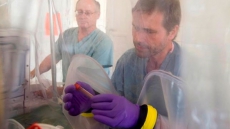FREDERICTON - After a 32-day election campaign fought largely on jobs, voters in New Brunswick decide Monday between a Liberal plan to turn the economy around through government stimulus or a Progressive Conservative promise to allow greater development of the province's natural resources.
The Tories and Liberals are the dominant forces in New Brunswick politics and the choices offered by the two main parties on the economy are vastly different.
Liberal Leader Brian Gallant is promising to spend $900 million over six years on infrastructure, a proposal he says would create more than 1,700 jobs a year in a province with one of the worst employment records in the country.
Progressive Conservative Leader David Alward is pinning his re-election hopes on a plan to allow more softwood on Crown land to be harvested by forestry companies while also embracing energy companies that want to drill for shale gas, a divisive issue that led to a violent protest last year in Rexton where seismic testing was done.
Alward believes the province is on the verge of $10 billion in private investment flowing from the shale gas sector and the proposed Energy East Pipeline, which would see oil shipped from Alberta to Saint John.
On shale gas, Gallant is taking a more cautious approach, promising a moratorium on hydraulic fracturing, or fracking, until more study is done on the risks.
The final full day of the campaign on Sunday saw Gallant and Alward pump up the party faithful at a series of rallies and barbecues.
Gallant, 32, predicted a tight outcome as he campaigned in Saint-Antoine in front of a memorial to legendary Liberal premier Louis Robichaud, the first Acadian to be elected premier of New Brunswick in 1960.
"Louis Robichaud would be one of my political idols," said Gallant, a lawyer who grew up in the Acadian community of Grande-Digue, just northeast of Moncton.
Alward campaigned on the party's main slogan on Sunday, which has featured ads where the Tories encourage voters to "Say Yes" to different pieces of their platform.
"It's about saying 'Yes' to our province, it's about saying 'Yes' to our people and about saying 'Yes' to providing opportunities to our people to have great jobs here and set strong roots for their families," Alward, who operates a small family farm near Woodstock, told a rally in Moncton.
Alward, 54, played down concerns about the environment on shale gas as he argued the industry could stop workers heading to other parts of the country where the job prospects are better.
"The reality is it is being done safely," Alward said. "I have the obligation to build a strong province, to give opportunities for our people to be able to have great jobs here and set strong roots here instead of being separated by thousands of miles."
At the final debate of the campaign on Thursday, Alward conceded he is disappointed the Conservatives didn't fulfill all of the promises they made in 2010, including balancing the government's books during their mandate.
The NDP led by Dominic Cardy, 44, is pinning its hopes of a breakthrough on voters' dissatisfaction with the grip the Liberals and the Progressive Conservatives have had on the province, presenting itself as a fresh voice that is badly needed in the legislature.
Cardy became leader of the party in 2011 and his campaign has been bolstered by three high-profile NDP candidates who previously held seats in the house for the Tories and the Liberals. The NDP has never won more than one seat in New Brunswick and was shut out of the legislature in the last election.
The NDP has promised to wait two years before considering development of a shale gas sector, at which point companies wanting to exploit the resource would have to undergo tests to assure health and environmental concerns are satisfied. Cardy has also committed to setting up a royalty rate and putting shale gas development to a free vote in the house.
In the late stages of the campaign, Cardy became a frequent target for Gallant as some observers speculated the Liberals feared a rise in support for the NDP could hurt their chances on election day by splitting the vote in some ridings.
Green leader David Coon, 57, spent the last day of the campaign pushing for action on climate change, saying practical solutions to reduce New Brunswick's carbon footprint would lead to new jobs.
At dissolution, the Progressive Conservatives had 41 seats, the Liberals 13 and there was one Independent. Redistribution will see the number of seats in the house cut to 49 from 55 in this election.





